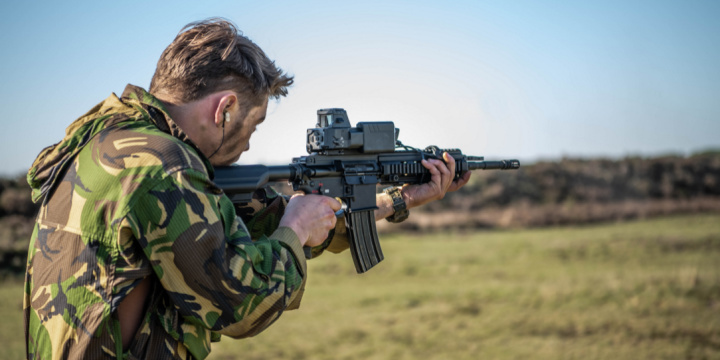
Israeli defense firm’s Smart Shooter’s SMASH system. Photo: Captain Fred Warmer
As Israel faces new threats from unmanned aerial vehicles on multiple fronts, an Israeli startup has developed an artificial intelligence-based device allowing infantry soldiers to bring down drones from up to several hundred feet away and hit their targets with greater precision.
In 2006, Michal Mor, CEO of Smart Shooter, saw her husband called up on reserve duty on short notice for the Second Lebanon War. An engineer with experience in missile technology, she recognized that infantry units were not equipped with the technology to precisely hit targets like guided missiles.
She knew the role that the Israel Defense Force reserves has played in defending the Jewish state throughout its history, but that these soldiers had also faced considerable challenges in quickly getting up to speed on operational shooting capabilities, Mor told The Algemeiner in an interview.
“In combat, you need to be precise and fast. That is the real challenge. Our goal is to make them hit the target, whatever it is — a terrorist, attacking a drone, or any other target with ultimate precision, regardless of your mental, physical skills and regardless of stress factors,” Mor said.
Related coverage
February 18, 2022 4:21 pm
Whether in the IDF or NATO, the primary reasons targets are missed are the instability of the soldier or of the platform, and the movement of the target, she noted.
“The combination of seeing that lack of technology in infantry units, and knowing that the technology exists as I come from the world of precise, surgical missile technology, made me want to combine it together,” Mor told The Algemeiner. “We wanted to bring technology to a different level of just having a piece of metal and going into war.”
Mor — who previously worked for Israel’s defense contractor Rafael Advanced Defense Systems, leading research and development groups in the missile unit — co-founded Smart Shooter with Avshalom Erlich in 2011. The resulting technology fits onto standard rifles and uses targeting algorithms and electro-optical processing capabilities to track and strike targets on the ground, in the air, and at sea.
Mor’s efforts at Smart Shooter were initially met with skepticism, she recalled, as infantry units are not considered the most fertile ground for high-tech innovation. And pitching a startup to make rifles more lethal that was founded and run by a woman did cause some people to “raise their eyebrows,” she added.
“The challenge was to introduce this new paradigm, which was like introducing a smartphone, when they had a Nokia, which lasts forever,” Mor remarked.
“When I first came to the IDF, they didn’t understand what I was talking about, because fire control and algorithms, image processing and AI is not from their world. It is a world of metal and glass,” she said. “It was only when I explained it to the missile people in the IDF, they understood the potential.”
Today, infantry soldiers armed with a rifle in the IDF are using the startup’s Smash fire control systems to hit moving targets with precision, and to shoot down drones and incendiary balloons sent over the Gaza Strip border by terrorist operatives, Mor said. The rifle-mounted device helps increase precision to some 200-300 meters, helping soldiers stay more protected and minimize casualties, particularly in densely populated areas of operations. Army figures indicate that with the use of the Smash fire control systems, soldiers have an 80 percent chance of hitting their target with one shot, Mor asserted.
“In a hectic world of infantry combat in a war environment, we need to reduce collateral damage to bystanders and to those unfortunate entities that are caught in the line of fire,” Mor said.
Another line developed by the startup is the Smash Hopper, a light-weight, remote-controlled station that can be mounted on vehicles, surface vessels, and along border fences to confront small unmanned aerial vehicles (UAVs) and other threats.
This week alone, Israel’s north saw several glimpses of the drone threat emanating from Lebanon’s Hezbollah. The IDF shot down a drone launched by the Lebanese militant group on Thursday that crossed into Israeli airspace, and another Hezbollah drone triggered Israeli air defenses on Friday. A report last year warned that Hezbollah has amassed about 2,000 UAVs over the past 15 years, with the help of Iran.
Smart Shooter’s systems are also deployed by the US Special Forces, and its anti-drone systems have been used in Afghanistan, Mor said. Fifteen forces from around the world, including Australia and India, have selected the Israeli manufacturer’s technology. With its latest product unveiled in January, the Smash Dragon, those forces can mount an armed system onto UAVs to be controlled from a distance, firing infantry weapons while flying.
“In my vision, all of those are communicating together, acting together,” Mor said. “There should never be a soldier alone in the alley.”
Credit: Source link




















